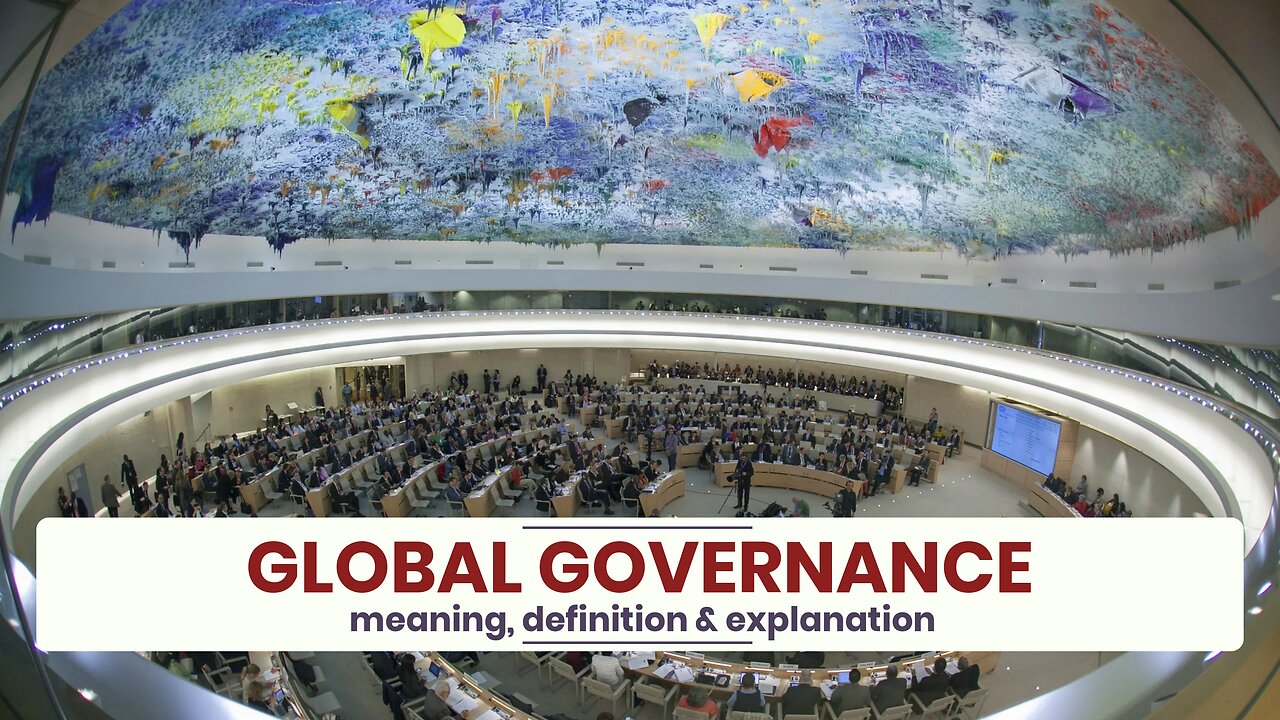Premium Only Content

What is GLOBAL GOVERNANCE?
✪✪✪✪✪
http://www.theaudiopedia.com
✪✪✪✪✪
What does GLOBAL GOVERNANCE mean? GLOBAL GOVERNANCE meaning - GLOBAL GOVERNANCE definition - GLOBAL GOVERNANCE explanation. What is the meaning of GLOBAL GOVERNANCE? What is the definition of GLOBAL GOVERNANCE? What does GLOBAL GOVERNANCE stand for? What is GLOBAL GOVERNANCE meaning? What is GLOBAL GOVERNANCE definition?
Global governance or world governance is a movement towards political integration of transnational actors aimed at negotiating responses to problems that affect more than one state or region. It tends to involve institutionalization. These institutions of global governance—the United Nations, the International Criminal Court, the World Bank, etc.—tend to have limited or demarcated power to enforce compliance. The modern question of world governance exists in the context of globalization and globalizing regimes of power: politically, economically and culturally. In response to the acceleration of interdependence on a worldwide scale, both between human societies and between humankind and the biosphere, the term "global governance" may also be used to name the process of designating laws, rules, or regulations intended for a global scale.
Global governance is not a singular system. There is no "world government" but the many different regimes of global governance do have commonalities:
“ While the contemporary system of global political relations is not integrated, the relation between the various regimes of global governance is not insignificant, and the system does have a common dominant organizational form. The dominant mode of organization today is bureaucratic rational – regularized, codified and rational. It is common to all modern regimes of political power and frames the transition from classical sovereignty to what David Held describes as the second regime of sovereignty – liberal international sovereignty.
In a simple and broad-based definition of world governance, the term is used to designate all regulations intended for organization and centralization of human societies on a global scale. Forum for a New World Governance ; Reasons for this Forum for a new World Governance
Traditionally, government has been associated with "governing," or with political authority, institutions, and, ultimately, control. Governance however denotes formal political institutions that aim to coordinate and control independent social relations, and that have the ability to enforce, by force, their decisions. However, authors like James Rosenau have also used "governance" to denote the regulation of interdependent relations in the absence of an overarching political authority, such as in the international system. Some now speak of the development of "global public policy".
Adil Najam, a scholar on the subject at the Pardee School of Global Studies, Boston University has defined global governance simply as "the management of global processes in the absence of global government." According to Thomas G. Weiss, director of the Ralph Bunche Institute for International Studies at the Graduate Center (CUNY) and editor (2000–05) of the journal Global Governance: A Review of Multilateralism and International Organizations, "'Global governance'—which can be good, bad, or indifferent—refers to concrete cooperative problem-solving arrangements, many of which increasingly involve not only the United Nations of states but also 'other UNs,' namely international secretariats and other non-state actors." In other words, global governance refers to the way in which global affairs are managed.
The definition is flexible as to scope; it applies whether the subject is general (e.g. global security and order) or specific (e.g. the WHO Code on the Marketing of Breast Milk Substitutes). It is flexible enough as to reach; it applies whether the participation is bilateral (e.g. an agreement to regulate usage of a river flowing in two countries), function-specific (e.g. a commodity agreement), regional (e.g. the Treaty of Tlatelolco), or global (e.g. the NPT). These "cooperative problem-solving arrangements" may be formal, taking the shape of laws or formally constituted institutions for a variety of actors (such as state authorities, intergovernmental organizations (IGOs), non-governmental organizations (NGOs), private sector entities, other civil society actors, and individuals) to manage collective affairs. They may also be informal (as in the case of practices or guidelines) or ad hoc entities (as in the case of coalitions).
-
 2:28
2:28
The Audiopedia
9 months agoWhat is MORTGAGE BROKER?
21 -
 LIVE
LIVE
GrimmHollywood
7 hours ago🔴LIVE • GRIMM HOLLYWOOD • CLASSIC HALO • WITH THE ROCKSTARS of RUMBLE •
229 watching -
 LIVE
LIVE
MissesMaam
7 hours agoCan we survive the Oregon Trail ? 💚✨
229 watching -
 12:19
12:19
Mrgunsngear
1 day ago $8.34 earnedHUXWRX RAD 9 Suppressor Review
71.2K30 -
 7:16:30
7:16:30
JdaDelete
8 hours ago $0.36 earnedThe Legend of Zelda: Oracle of Seasons | Part 2
9.34K -
 LIVE
LIVE
LumpyPotatoX2
5 hours agoSub-Sunday with Casual Verdansk - #RumbleGaming
154 watching -
 23:50
23:50
marcushouse
20 hours ago $6.78 earnedStarship Is About to Do Something It’s Never Done Before - A Huge First!
70.7K20 -
 2:35:00
2:35:00
DJC GAME STUDIOS
4 hours ago $0.64 earnedThe Sunday BrUnCh StReAm - LIVE Retro Gaming with DJC
14.3K -
 LIVE
LIVE
FrizzleMcDizzle
5 hours agoElden Ring Seamless COOP
90 watching -
 41:56
41:56
CatfishedOnline
2 days agoKinky Man Sends 401k to Romance Scammer from Ghana!
52.1K18